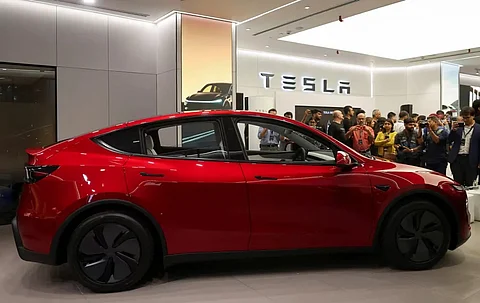

Tesla has begun selling cars in India, the world’s most populous country – but at a steep price. The electric carmaker, which is grappling with declining sales and complications arising from CEO Elon Musk’s political entanglements, opened its first showroom in Mumbai on Tuesday. As it seeks to revive sales, tapping into a new market with a large base of potential buyers could offer a much-needed boost.
According to Tesla’s website, the Model Y is priced at ₹61,07,190 – roughly $71,000. By contrast, the same vehicle is listed for US buyers at around $45,000, before factoring in a $7,500 federal tax credit for electric vehicles (EVs), which brings the cost down to $37,500.
Tesla has long expressed a desire to enter the Indian market. However, steep import tariffs on foreign vehicles – which can more than double the cost of a car – have proven a significant barrier.
“We’ve been working on getting into India. India is a very hot market,” said Tesla CFO Vaibhav Taneja during an investor call in April. “It will be a great market to enter because India has a big middle class.”
However, he acknowledged that tariffs “create a little bit of tension, which we’re trying to work around.”
India is the world’s third-largest automobile market, trailing only China and the United States. Tesla’s absence has affected its global sales, which are currently experiencing the sharpest decline in the company’s history. The downturn comes amid intensifying competition and growing resistance in some markets to Musk’s political activities.
Almost 50 percent of Tesla’s sales revenue originates in the United States, with just over 20 percent coming from China. The remaining 30 percent is generated across other international markets.
Meanwhile, trade talks between the United States and India are ongoing. Two months ago, President Donald Trump announced that India had offered to eliminate tariffs on US imports as part of a proposed agreement to avoid the imposition of broad US tariffs on Indian exports. However, Indian officials at the time stated that no preliminary deal had been reached.
Tesla is facing rising competition not only from established automakers expanding their EV portfolios but also from Chinese manufacturers. It is on the verge of losing its position as the world’s top EV maker to China’s BYD – even though BYD is currently unable to sell in the US market.
The company has also seen key personnel departures. The Wall Street Journal reported on Tuesday that Troy Jones, Tesla’s Vice President of Sales and Service, has left the company, citing sources familiar with the matter. Tesla did not respond to requests for comment.
While Tesla executives have expressed interest in establishing a manufacturing plant in India, its existing factories in the US, China and Germany currently have more production capacity than demand. Plans for a new facility in Mexico are also on hold.